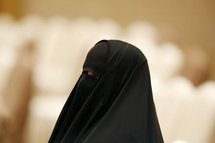UN presses Gulf states on rights of women, workers
AFP
JEDDAH- UN human rights chief Navi Pillay called Monday for Muslim Gulf states to lift restrictions on women and to improve the position of millions of foreign workers in the region.
"Women in the region are still unable to fully enjoy their human rights," Pillay, the UN High Commissioner for Human Rights, said on the first stop of a six-nation Gulf tour.

On her first-ever visit to Saudi Arabia, she said other Muslim states in the world have improved women's rights via "dynamic interpretations of Islamic traditions."
In those countries, governments and Islamic legal experts "demonstrated that far from being innovations, such legislation was compatible with Islamic jurisprudence and, indeed, stemmed from it."
She specifically cited the practice of requiring women to have a male guardian to move around outside the home, to appear in court and often to engage in business.
Such rules are enforced most commonly in Saudi Arabia, where society is governed according to ultra-conservative Wahhabi interpretation of Islam.
"It is also time to put to rest the concept of male guardianship," Pillay said.
She also criticised the treatment of an estimated 12 million foreign workers in the six countries of the Gulf Cooperation Council: Oman, Saudi Arabia, Qatar, Bahrain, Kuwait and the United Arab Emirates.
Many are subject to illegal practices like confiscation of their passports, withholding wages, and exploitation by job agents, she said.
Pillay singled out the systems in many of the countries which require workers to have local sponsors, known as Kafala.
"Some countries are reconsidering the sponsorship (or Kafala) system that rigidly binds migrants to their employers, enabling the latter to commit abuses, while preventing workers from changing jobs or leaving the country," she said.
"I wholeheartedly support those efforts and call on other states to replace the Kafala system with updated labour laws that can better balance rights and duties."
She called the situation of migrant domestic workers "of particular concern, because their isolation in private homes makes them even more vulnerable to physical, psychological and sexual violence."
"Thus, it is of the utmost importance that in crafting and applying migration policies, governments maintain a human rights approach to migration at the front and centre of their action."
The rights chief pointed to some improvements in the region, including the creation of national human rights institutions in several of the countries.
She also pointed to an "encouraging level" of governmental efforts to bolster childrens' rights, stop human trafficking, and improve economic rights.
And she praised efforts to expand women's education, which she called "not only fair" but also good policy to improve the community and national wellbeing and prosperity.
But she noted that at the same time some countries were tightening controls on freedom of association and expression, putting greater pressure on activists and the media who speak out on human rights violations.
Hosted by the Saudi Human Rights Commission, Pillay made her speech at the new university, lauded for allowing men and women researchers from around the world to work side-by-side, unlike the stiff controls on gender mingling enforced by religious conservatives outside the campus.
With entrance to the campus tightly controlled, however, few Saudis have ever been inside and only about 30 students and faculty, most of them non-Saudis, were on hand for the speech.
After the speech she visited the Organisation of the Islamic Conference in Jeddah, and was then to depart for a one-day stop in Qatar.
------------------------------------------------------------------------